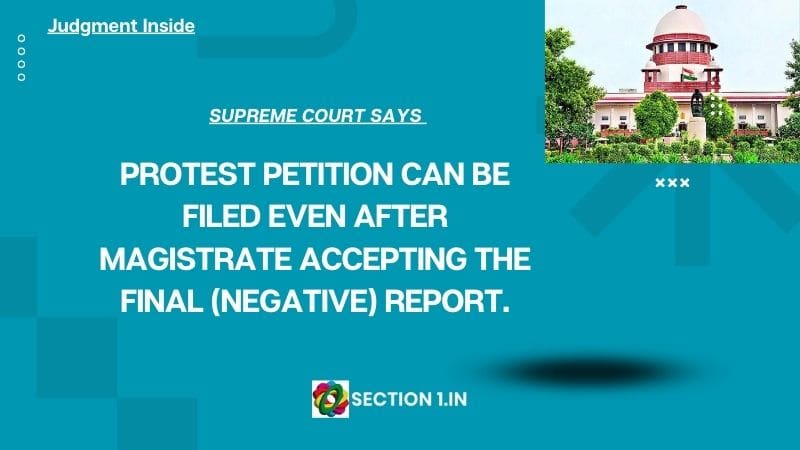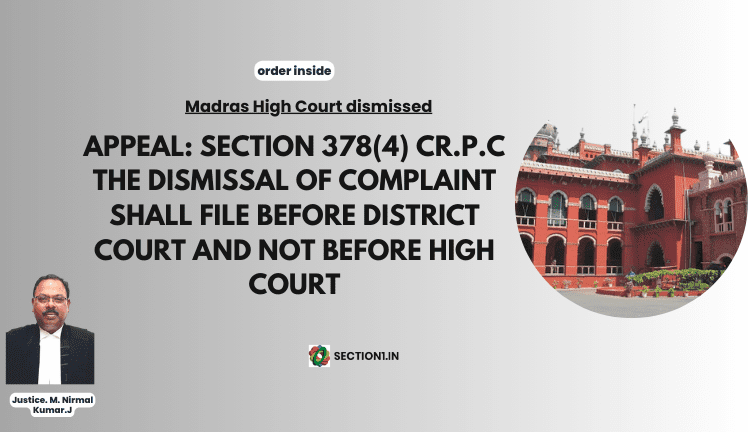SLP ground
- The two appeals arise out of the orders passed by the High Court of Judicature at Allahabad in the Application No.14899/2022 filed by the respondents-accused under Section 482 of the Code of Criminal Procedure, 1973 (for short, ‘Cr.P.C.’). These two appeals have been filed by the appellant-complainant challenging the order dated 21.07.2022 by which the High Court had granted the prayer made by the respondents-accused to amend the application filed under Section 482 Cr.P.C. and challenging the order dated 22.07.2022 by which the High Court has set aside the orders dated 15.11.2018 and dated 11.01.2022 passed by the Chief Judicial Magistrate (for short, ‘CJM’) in Misc. Case No.06/11/2018 arising 2 out of Case Crime No.907/2017. The High Court vide the impugned order further directed the concerned Magistrate to pass a fresh order on the Protest Petition filed by the appellant-complainant in the light of observations made by it in the impugned order.
XXX
- The High Court while passing the impugned order, observed as under: –
“20. When the findings recorded by concerned Magistrate as noted above, are examined in the light of the observations contained in paragraph 28 of the judgement in Hari Ram (supra) do not fulfill the mandate of law which the Magistrate is required to comply while exercising jurisdiction under Section 190 (1) (b) Cr.P.C. No finding has been recorded by concerned Magistrate with regard to the papers accompanying the police report. Without recording any finding that there is no evidence against applicants in the papers accompanying police report, the conclusion drawn by Magistrate to treat the protest petition as a complaint is not only illegal, but also arbitrary. Once the Magistrate came to 4 prima facie conclusion that investigation of concerned case crime number is unsatisfactory or is the outcome of lackadaisical approach of investigating Officer, then in that eventuality, concerned Magistrate ought to have directed further investigation in the matter. The findings recorded by concerned Magistrate in support of his conclusion to treat the protest petition as a complaint are by themselves insufficient to proceed with the protest petition as a complaint.”
9. In our opinion, the above observations recorded by the High Court are absolutely erroneous in view of the catena of decisions of this Court. 10. In Rakesh & Another Vs. State of Uttar Pradesh & Another1, it is observed as under: –
“…………………..”
XXX
11. In view of the above, there remains no shadow of doubt that on the receipt of the police report under Section 173 Cr.P.C., the Magistrate can exercise three options. Firstly, he may decide that there is no sufficient ground for proceeding further and drop action. Secondly, he may take cognizance of the offence under Section 190(1)(b) on the basis of the police report and issue process; and thirdly, he may take cognizance of the offence under Section 190(1)(a) on the basis of the original complaint and proceed to examine upon oath the complainant and his witnesses under Section 200. It may be noted that even in a case where the final report of the police under Section 173 is accepted and the accused persons are discharged, the Magistrate has the power to take cognizance of the offence on a complaint or a Protest Petition on the same or similar allegations even after the acceptance of the final report. As held by this Court in Gopal Vijay Verma Vs. Bhuneshwar Prasad Sinha and Others [(1982) 3 SCC 510], as followed in B. Chandrika Vs. Santhosh and Another [(2014) 13 SCC 699], a Magistrate is not debarred from taking cognizance of a complaint merely on the ground that earlier he had declined to take cognizance of the police report. No doubt a Magistrate while exercising his judicial discretion has to apply his mind to the contents of the Protest Petition or the complaint as the case may be.
- So far as the facts of the present case are concerned, the concerned CJM vide the detailed order passed on 15.11.2018 had rejected the final report submitted by the Investigating Officer and had accepted the Protest Petition, and decided to proceed further under Section 200 Cr.P.C. Such a course opted by the CJM was absolutely just, legal and proper in the facts and circumstances of the case. The said order dated 15.11.2018 remained unchallenged at the instance of the respondents-accused. It was only when the concerned CJM after recording the statements of the complainant and eight witnesses, issued summons on 11.01.2022, the respondents filed the application challenging the said order dated 11.01.2022 under Section 482 before the High Court, and in the said application, the order dated 15.11.2018 came to be challenged by way of amendment. As such, the High Court should not have permitted the respondents-accused to amend the Application for challenging the order dated 15.11.2018 after about four years of its passing, and in any case should not have interfered with the discretion exercised by the CJM within the four corners of law. The discretionary order of 11.01.2022 passed by the concerned CJM issuing summons to the accused, after recording statements of the complainant and the eight witnesses and after recording prima facie satisfaction about the commission of the alleged crime, also did not warrant any interference by the High Court. In our opinion, the High Court has committed gross error in setting aside the orders dated 15.11.2018 and 11.01.2022 passed by the CJM.
-
In that view of the matter the impugned orders passed by the High Court being highly erroneous, the same are quashed and set aside. The concerned CJM is directed to proceed with the complaint case in accordance with law. It shall be open for the respondents accused to respond to the summons and appear before the concerned CJM within two weeks.
Party
ZUNAID vs. STATE OF U.P. & ORS – CRIMINAL APPEAL NOS.2628-2629 OF 2023 (@ SLP(CRL.) Nos.8506-8507/2022) – 29TH AUGUST, 2023.
https://main.sci.gov.in/supremecourt/2022/25678/25678_2022_15_29_46563_Judgement_29-Aug-2023.pdf






